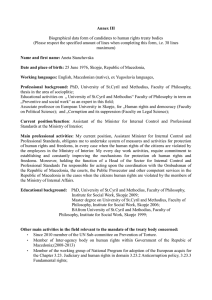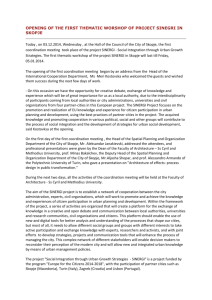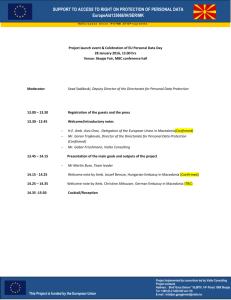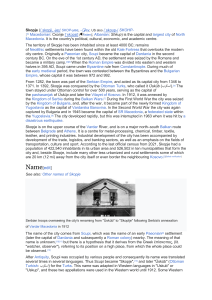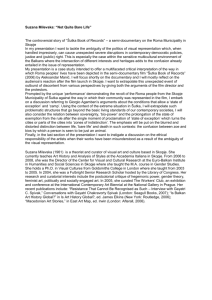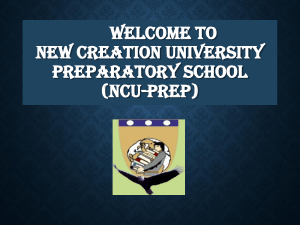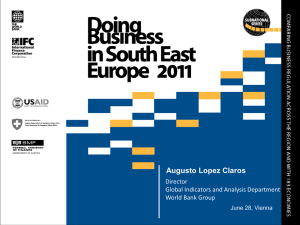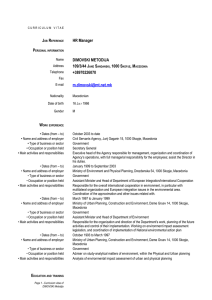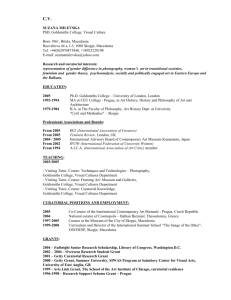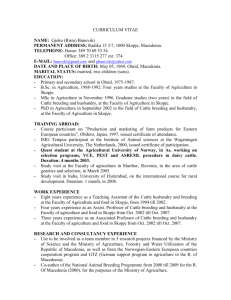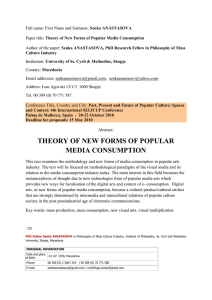PPT - BETA | IATEFL Affiliate
advertisement
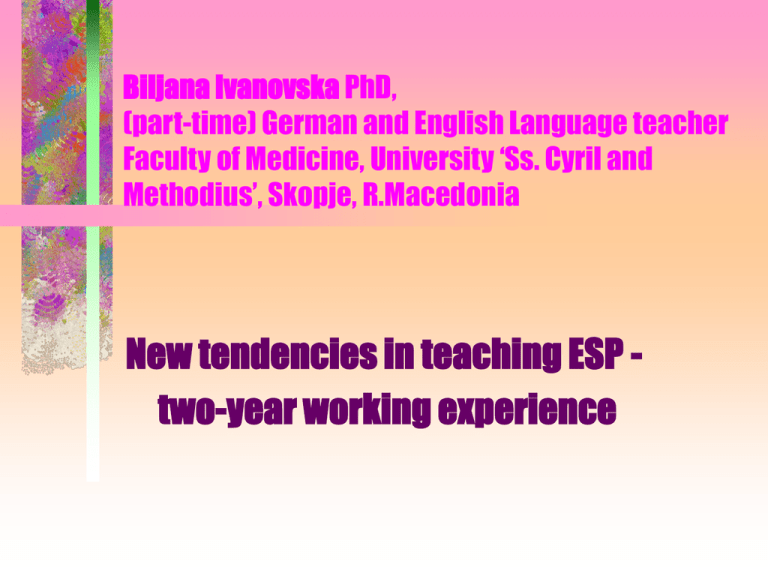
Biljana Ivanovska PhD, (part-time) German and English Language teacher Faculty of Medicine, University ‘Ss. Cyril and Methodius’, Skopje, R.Macedonia New tendencies in teaching ESP two-year working experience • This paper presents my two-year working experience teaching English for specific purposes (ESP) at the Faculty of Medicine in Skopje, the Republic of Macedonia. Background • The ‘Ss. Cyril and Methodius University” in Skopje is the first state university in the Republic of Macedonia which was founded in 1949 and today it represents a family of twentythree faculties, ten institutes and other institutions. • As an independent faculty within the University in Skopje it educates highly trained professionals: doctors, graduated nurses, graduated medical technicians, radiographers, speech and language therapists, psychotherapists, and its syllabus is designed to meet the needs of the health managing system not only in our country but also in the west European countries. • The Republic of Macedonia was admitted to the United Nations; • -Council of Europe; • -La Francophonie; • -the World Trade Organization (WTO); • -the Organization for security and cooperation in Europe; • -a candidate for joining the European Union and has applied for NATO membership. • At the Faculty of Medicine, the English, German and the French language are taught as elective subjects, within the syllabus designed for foreign languages, developing 45 academic classes in form of credit-transfer system during the first semester in the first year of studying. The students have the opportunity to chose between the English, German and the French language and those who would like to learn English (as ESP) make a single group, which is further subdivided into 2 subgroups. Justification for using multimedia technology in language programs • Numerous researches have reported on the theoretical constructs that support the use of multimedia technology for EFL instruction (in Mayora , ETF, 2006: 15). This research shows that using multimedia technology in the classroom: • -allows students to work individually at a computer station, at their own pace, and according to their own needs; • -helps teachers to deal more effectively with a large group of students; • -makes the introduction and presentation of content more dynamic and attractive for students; • -increases student motivation due to the • • • • interactive nature of the activities; -trains students to self-monitor and self-assess their progress, which promotes autonomous learning; -promotes a task based approach to learning; -allows students to experience real-life and communicatively meaningful language situations and contexts; and -introduces a variety of print, audio, and visual materials that match different student learning styles and preferences. • My experience using Internet Activity 1 • Students were ask to surf the net looking for sites they were interested in. The options such as advances search, preferences and language tools (which are on www-google) were previously explained to them. I split the same group into three. The first sub-group was searching the free on-line medical encyclopedias, the second one the free online medical dictionaries (English-English, EnglishMacedonian and vice versa), and the third one the medical atlases. • The suggested links were the following: • www.online-medical-dictionary.org/;www.thefreedictionary.com/; ww.medterms.com/;medical-dictionary.com/; www.askdrwalker.com/index/medical_dictionary.htm;www.medterms.com/; www.thefreedictionary.com/;en.wikipedia.org/wiki/Encyclopedia; en.wikipedia.org/wiki/Medicine;www.medfriendly.com/ www.doctorslounge.com/;medical-dictionary;thefreedictionary.com/; www.merck.com/mmhe/index.html ( also the web-sites of the National University Library ‘Ss. Kliment Ohridski’,Skopje, Macedonian Central Medical Library, the Faculty of Medicine). – Encyclopedia Britannica - http://www.britannica.com; Wikipedia http://www.wikipedia.org; Columbia Encyclopedia – http://www.bartleby.com/65; MEDLINEplus-Medical Encyclopedia http://www.nlm.nih.gov/medlineplus/encyclo pedia.html – Internet dictionaries: http://cancerweb.ncl.ac.uk/omd; http://www.nlm.nih.gov/medlineplus/mplusdi ctionary; http://dictionary.reference.com/medical; http://www.merriam-webster.com; Multilingual Glossary of technical and popular medical terms in nine European Languages http://users.ugent.be/~rvdstich/eugloss/welc ome – I asked the students: – to collect a list of topics (for example: the human body, the locomotory system/bones, muscles, joints/, the digestive system etc.) they want to talk about; – to chose one particular topic they find interesting; – to share the information they have collected and have a discussion asking each other questions, expressing their own views, etc. Activity 2 • The application of case analysis in teaching medical English using the article given on http://www.fauxpress.com/kimball/res/task.ht. proposed by Jack Kimball (an article referring to Internet-assisted language learning “Topics in Medical English”). • Students are given a certain topic, e.g. "healthy lifestyle" and the problems and challenges that they as future doctors have to deal with. This is a small group activity. The case may be introduces in various ways: – – – – a lecture on lifestyle habits; introducing a topic with a statement; telling a personal story; referring to learners' own experience in healthy lifestyle; – brainstorming; Healthy Lifestyle Variety of nutrients whole grain bread fruits, vegetables maintain a healthy weight eat moderate portions eat regular meals reduce (don't eliminate) certain food make changes gradually select foods – The first activity was reading the text: Case report–student analysis: “Consider the case of Hiroshi Tanaka”, which reports on a 29-yearold Japanese computer specialist. The tasks that were given to the students were the following: 1. Identifing the problem: Summarize the case (the main ideas) in five sentences. Do not draw up any solutions. Describe the character of Hiroshi Tanaka and his everyday life and activities. How does he should approach the problem? – 2. Suggesting solutions: – Task: How would you deal with the situation if you were Hiroshi Tanaka? – Students were asked to assess each of the options and list their pros and cons. – Do you think that the solutions suggested would produce a desirable result? – 3. Selecting "Best " Option – What do you think Hiroshi Tanaka should do now? – How can he make sure that the situation is improved? – Give short review and talk about the serious issues for Mr. Tanaka. – Give him basic advice with detailed examples regarding the kind of diet he should consider adopting. – Suggest him reasons to change both his diet and other lifestyle habits. – The next stage was asking the students to write an article for publication in the on-line newsletter of the English language magazine. The students decide on the some problems that affect Mr. Tanaka’s health, e.g. misunderstanding about the nutrition and health, his life style, mental health and his personality, clinical problems, counseling of psychotherapists. – Activity 4 • Aquarium or ‘fish bowl’. Five students are sitting in the middle of a seminar room. Around them are the others students as observers. The teacher gives them a certain topic, (e.g. Diabetes mellitus). • The involved students make notes and the observers give their personal evaluation on this topic: agreement and/or disagreement. • Advantages : • - the possibility for individual work; • -acquiring practice skill; • -many interesting materials, handouts and interesting discussions; • friendly atmosphere; • -acquire some basic knowledge, learning word processing, lurking on the Net, sending E-mail messages to a friend; • -able to create things and think about how to use the basic computer programs; • -The teaching process using Internet is very interesting, motivating and useful. – The teaching process is focused more and more on student autonomy; – The computer can be one of the possible helping aids with its flexibility, variability, visuality; – Atlases and encyclopaedias offer an enormous amount of beautifully presented information, – Students also improve their linguistic features: discourse, functional, structural and lexical. Disadvantages-challenges – students are not strictly focused on the teacher; – the information and the tips are on the screen together with explanations and the answers; – technical problems may unexpected occur and the students expect the teacher to solve them. • - some students may be not feeling confident enough in front of machine; • -although they enjoy the learning process but sometime, students and teachers feel frustrated, helpless and need time to overcome the psychological barrier when working with these machines. – students might get lost in details and become obsessed with multimedia facilities (pictures, video, sound), lose focus, and need more time for task. – the students might get lost in details and become obsessed with multimedia facilities (pictures, video, sound), lose focus, and need more time for task. Conclusion – Teachers and students have no limits to their access of learning. It is worth experimenting and investigating the potentials Internet can offer. – I personally believe in the statement given by the former president of the United States Bill Clinton: ”Technology is reshaping our world at an astounding speed” (WHPR, 1995c) the meaning of which was adjusted to our needs in the same article by Pedroni (1996, 2): “We, as teachers need to restructure our philosophy of teaching”. • • • • • • References: Major, E. 1998. Experiences in using computer in the language classroom. Paper presented at the Conference on Foreign language for specific purposes. Varna, Bulgaria. Pandora, D., eds. 2000. Medicine and dentistry: ESP English for specific purposes. Skopje: ‘Cyril and Methodius’ University Press. Pedroni, E. G. 1996. The importance of the world wide web in education K-12. (August): 17. http://www.geocities.com/Athens/5461/paper_1.html#Top Mayora A. Carlos 2006. Integrating multimedia technology in a high school EFL program. English teaching forum. 2006Vol. 44 nr. 3, pp 14-21. Kimball J.: Task-based medical English: Elements for internet–assisted language learning,http://www.fauxpress.com/kimball/res/task.htm
